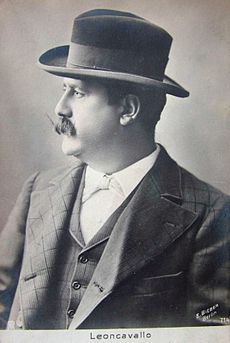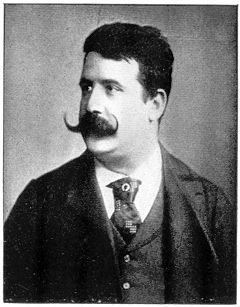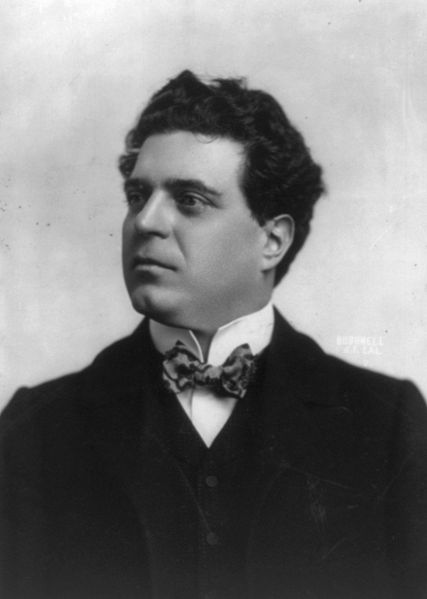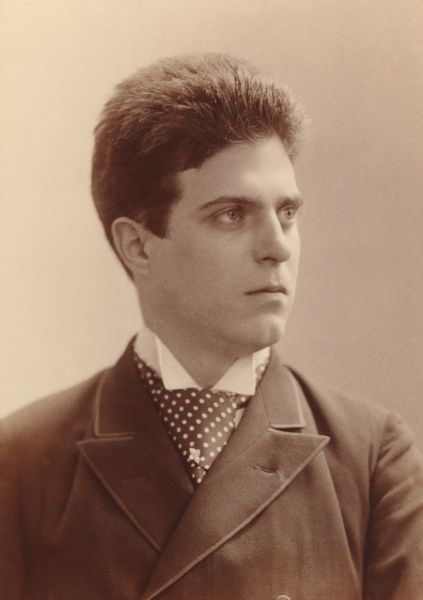<Back to Index>
- Composer Ruggiero Leoncavallo, 1857
- Composer Pietro Antonio Stefano Mascagni, 1863
PAGE SPONSOR


Ruggero (or Ruggiero) Leoncavallo (23 April 1857 – 9 August 1919) was an Italian opera composer. His two act work Pagliacci remains one of the most popular works in the repertory, appearing as number 20 on the Operabase list of the most performed operas worldwide.
The son of a police magistrate, Leoncavallo was born in Naples on 23 April 1857. As child he moved with his father in the town of Montalto Uffugo in Calabria where Leoncavallo lived during his adolescence. He later returned to Naples and was educated at the city's San Pietro a Majella Conservatory. After some years spent teaching and in ineffective attempts to obtain the production of more than one opera, he saw the enormous success of Pietro Mascagni's Cavalleria rusticana in 1890, and he wasted no time in producing his own verismo hit, Pagliacci. (According to Leoncavallo, the plot of this work had a real life origin: he claimed it derived from a murder trial, in Montalto Uffugo, over which his father had presided.)
Pagliacci was performed in Milan in 1892 with immediate success; today it is the only work by Leoncavallo in the standard operatic repertory. Its most famous aria "Vesti la giubba" ("Put on the costume" or, in the better known older translation, "On with the motley") was recorded by Enrico Caruso and laid claim to being the world's first record to sell a million copies (although this is probably a total of Caruso's various versions of it made in 1902, 1904 and 1907).
The next year his I Medici was also produced in Milan, but neither it nor Chatterton (belatedly produced in 1896) — both early works — obtained much lasting favor. Much of Chatterton, however, was recorded by the Gramophone Company (later HMV) as early as 1908, and remastered on CD almost 100 years later by Marston Records. Leoncavallo himself conducts the performance.
It was not until Leoncavallo's La bohème was performed in 1897 in Venice that his talent obtained public confirmation. However, it was outshone by Puccini's opera of the same name and on the same subject, which was premiered in 1896. Two tenor arias from Leoncavallo's version are still occasionally performed, especially in Italy.
Subsequent operas by Leoncavallo were 1900's Zazà (the opera of Geraldine Farrar's famous farewell performance at the Met), and 1904's Der Roland von Berlin. He had a brief success with Gli zingari which premiered in Italian in London in 1912, with a long run at the Hippodrome Theatre. Gli zingari also reached the United States but soon disappeared from the repertoire.
After a series of operettas, Leoncavallo tried for one last serious effort (Edipo Re), but he died before he could finish the orchestration, which was completed by Giovanni Pennacchio. From the 1970s the opera has had a number of revivals, both as concert performances (including Rome 1972, Amsterdam 1977 and Vienna 1998) as well as fully staged productions in Turin in 2002 and the Thessaloniki Opera 2008. In Edipo Re (a short one act work) the composer uses exactly the same melody for the final scene Miei poveri fior, per voi non più sole... (with the blinded Edipo) as he had for the Act IV Soprano aria from Der Roland von Berlin. It has been assumed (The New Grove Dictionary of Opera) that Leoncavallo left the opera more or less complete (except for the orchestration), but Pennacchio may have had to do more and may have 'filled in the gaps' using Leoncavallo's earlier music. Unusually, Leoncavallo did not write the libretto. The libretto for Edipo Re was written by Giovacchino Forzano, who also wrote Il piccolo Marat for Pietro Mascagni and two of the one act operas for Puccini's Il trittico.
Little or nothing from Leoncavallo's other operas is heard today, but the baritone arias from Zazà were great concert and recording favorites among baritones and Zazà as a whole is sometimes revived, as is his La bohème. The tenor arias from La bohème remain recording favorites.
Leoncavallo also composed songs, most famously Mattinata, which he wrote for the Gramophone Company (which became HMV) with Caruso's unique voice in mind. On 8 April 1904, Leoncavallo accompanied Caruso at the piano as they recorded the song. On December 8, 1905 he recorded five of his own pieces for the reproducing piano Welte - Mignon.
Leoncavallo was the librettist for most of his own operas. Many considered him the greatest Italian librettist of his time after Boito. Among Leoncavallo's libretti for other composers is his contribution to the libretto for Puccini's Manon Lescaut.
Ruggero Leoncavallo died in Montecatini Terme, Tuscany, on 9 August 1919.


Pietro Antonio Stefano Mascagni (December 7, 1863 – August 2, 1945) was an Italian composer most noted for his operas. His 1890 masterpiece Cavalleria rusticana caused one of the greatest sensations in opera history and single - handedly ushered in the Verismo movement in Italian dramatic music. Though it has been stated that Mascagni, like Leoncavallo, was a "one - opera man" who could never repeat his first success, this is inaccurate. L'amico Fritz and Iris have been popular in Europe since their respective premieres. In fact, Mascagni himself claimed that at one point Iris was performed in Italy more often than Cavalleria.
Mascagni wrote fifteen operas, an operetta, several orchestral and
vocal works, as well as songs and piano music. He enjoyed immense success during his lifetime, both as a composer
and conductor
of his own and other people's music. If he never repeated
the international success of Cavalleria, it was
probably because Mascagni refused to copy himself. The
variety of styles in his operas — the Sicilian passion and
warmth of Cavalleria, the exotic flavor of Iris,
the idyllic breeze that ventilates the charming L'amico
Fritz and Lodoletta, the Gallic chiaroscuro of Isabeau,
the steely, Veristic power of Il piccolo Marat,
the overripe postromanticism of the lush Parisina
— demonstrate a versatility that surpasses even that of Puccini.
Pietro Antonio Stefano Mascagni was born in Livorno, Tuscany, the second son of Domenico and Emilia Mascagni. The father was the owner of a bakery. Mascagni's lifelong friend and collaborator, Giovanni Targioni - Tozzetti ("Nanni") was born the same year in the same city.
In 1876, he began musical studies with Alfredo Soffredini, who founded the Instituto Musicale di Livorno (later called Istituto Cherubini) after having just completed his musical studies in Milan. Also from Livorno, Soffredini was a composer, teacher and musical critic.
In 1879, he composed several works: Sinfonia in do
minore, Elegia, Kyrie, Gloria
and Ave Maria.
The premiere of Mascagni's first cantata, In Filanda, took place at the Istituto Cherubini on February 9, 1881. The cantata was presented at a musical contest in Milan and won the first prize. In the same year Mascagni met Arrigo Boito and Amilcare Ponchielli in Milan.
In 1882, he composed his Cantata alla gioia from a text by Schiller, La stella di Garibaldi for voice and piano and La tua stella. On May 6, Mascagni left Livorno for Milan. He passed the admission examination of the Milan Conservatory on October 12. In Milan, Mascagni met Giacomo Puccini.
On January 9, 1883, Mascagni's sister, Maria, died. The cantata In Filanda became Pinotta, and was proposed for the musical contest of the Conservatorio, but the registration, being late, was not accepted.
In 1884, he composed Ballata for tenor and piano; M'ama non m'ama, scherzo for soprano and piano; Messagio d'amore, and Alla luna.
In 1885, Mascagni composed Il Re a Napoli in Cremona, romance for tenor and orchestra, on a text by Andrea Maffei. He left Milan without completing his studies. He toured as conductor in the operetta companies of Vittorio Forlì, Alfonso and Ciro Scognamiglio, and in Genova, the company of Luigi Arnaldo Vassallo.
Mascagni met the impresario Luigi Maresca in 1886. That December, Mascagni arrived in Cerignola with Maresca's company. He was accompanied by Argenide Marcellina Carbognani (Lina), his future wife. Helped by the mayor Giuseppe Cannone, Mascagni soon left the company of Maresca, not without problems, and became master of music and singing of the new philharmonia of Cerignola, where he earned a lot of esteem. He also gave piano lessons.
In February 1888, work on the Messa di Gloria started. In July, Casa Sonzogno announced in the Teatro Illustrato its second competition for a one act opera.
Pietro and Lina were married on February 3, 1889. The
next day Domenico Mascagni ("Mimì") was born. The
composition of Cavalleria rusticana
was completed on May 27 and the manuscript sent to Milan.
On February 21, 1890, Mascagni was summoned to Rome to present his opera. The première of Cavalleria rusticana, winner of the Sonzogno contest, was held May 17 at the Teatro Costanzi in Rome. The success was outstanding, and very soon the opera was performed in Florence, Turin, Bologna, Palermo, Milan, Genoa, Naples, Venice and Trieste. In December, Gustav Mahler conducted the opera in Budapest. Soon thereafter, the cities of Munich, Hamburg, St. Petersburg, Dresden and Buenos Aires welcomed the opera. In March 1891, it was sung in Vienna. At age 26, Mascagni had become famous overnight. In the meantime (January 3) his second son, Dino, was born. He was followed by a daughter, Emi, in 1892.
L'amico Fritz, Mascagni's second most successful opera, was premiered October 31 at the Teatro Costanzi in Rome. I Rantzau was premiered November 10 at the Teatro La Pergola, in Florence, under the direction of the composer himself.
Next Mascagni's opera was the Silvano (1894). On February 16, 1895 Guglielmo Ratcliff was premiered at the Teatro alla Scala of Milan. On March 15, Silvano was premiered at the Teatro alla Scala of Milan. Mascagni in the same year accepted the directorship of the Liceo Rossini in Pesaro.
On March 2, 1896, Mascagni conducted the première of Zanetto at the Liceo.
On June 29, 1898 in Recanati, Mascagni conducted the première of a symphonic poem, A Giacomo Leopardi. Iris, Mascagni's first collaboration with Luigi Illica was premiered on November 22 at the Teatro Costanzi in Rome.
Mascagni's father died in May 1899.
In 1900, Mascagni toured Moscow and St. Petersburg.
On January 17, 1901, Le maschere was premiered in six Italian theaters. Giuseppe Verdi died on January 27 and the following month Mascagni commemorated Verdi's passing. That same year, he conducted Verdi's Requiem in Vienna.
Mascagni composed the incidental music for Hall Caine's play, The Eternal City in August 1902; the première of the play with Mascagni's music took place in London on October 2.
In 1902 and 1903, he toured in Canada and in the United States, in particular Montreal, New York City, Philadelphia, Boston and San Francisco, where he conducted many of his and other composers' works. The tour was mostly a fiasco, except for the visit to San Francisco where Mascagni was extremely well received.
In 1903, Mascagni left Pesaro after problems with the authorities. He became director of the Scuola Musicale Romana, in Rome. In the same year he signed a contract with the French editor Paul de Choudens.
Amica, based on a poem by Choudens with French libretto by Paul Collin, was premiered on March 16, 1905, in Monte - Carlo. That year, he had disputes with Ruggiero Leoncavallo and Giacomo Puccini. He also had the Livornese première of Le maschere.
Mascagni was director of the Costanzi for the season
beginning in August 1909.
On April 4, 1910, Mascagni began a relationship with Anna Lolli. In October he was reconciled with Puccini.
Mascagni ceased his activity as director of the Scuola Musicale Romana in 1911. That May, he left for Buenos Aires, beginning a seven month tour in South America. The première of Isabeau took place in Buenos Aires on June 2.
The Italian première of Isabeau was held simultaneously at La Scala in Milan (conductor Tullio Serafin) and at La Fenice in Venice (conductor Mascagni) in 1912. On March 28, he began to work on Parisina in Bellevue, near Paris, sometimes with his daughter Emi, his mistress Anna Lolli, and the librettist Gabriele d'Annunzio.
Parisina was premiered in Milan on December 15 of that year. Almost all the important Italian composers of the time were present, among them Puccini, Umberto Giordano and Riccardo Zandonai. The new work was premiered in Livorno and Rome in 1914. On July 28 occurred the events that shortly led to World War I: Puccini and Mascagni were against the involvement of Italy in this war, where Mascagni's son Dino was later made a prisoner.
In 1915 Mascagni wrote music for Nino Oxilia's movie Rapsodia Satanica; the custom was for silent films to be accompanied live in a theater by organ, piano, or an orchestra, often using a prepared score (sometimes with original music) with cues for the conductor or musician. Mascagni had a quarrel regarding the rights of Louise de la Ramée's Two Little Wooden Shoes (I due Zoccoletti), that inspired both Puccini and Mascagni. The subject was retained by Mascagni for Lodoletta. The latter opera was premiered on April 30, 1917 in Rome. The Livornese première of the opera was on July 28 with Beniamino Gigli as Flammen.
Sì, Mascagni's operetta, was
premiered on December 13 in Rome.
In 1920 Mascagni composed Il piccolo Marat, which was premiered in Rome on May 2, 1921, following by a premiere in Buenos Aires in September. The composer returned to South America for a tour beginning in May 1922.
In 1923, he composed Visione Lirica. He moved to the Albergo Plaza in Rome in 1927, a place he would not leave until his death.
In 1930, Mascagni conducted La bohème in Torre del Lago, as a homage to Puccini, who had died in 1924. In 1931, Le maschere was performed at La Scala.
Pinotta was premiered in San Remo on March 23, 1932. He joined the PNF (Fascist party), following the example of many contemporary musicians, including Giordano.
Nerone was premièred in Milan on January 16, 1935, followed by the première in Livorno on August 24.
In June 1936, Mascagni's son
died in Somalia.
In 1940, celebrations for the fiftieth anniversary of his most popular opera, Cavalleria rusticana, took place all over Italy, often with Mascagni conducting. The opera was recorded for La Voce del padrone ("His Master's Voice") at La Scala under the direction of Mascagni, who recorded a special spoken introduction. EMI later reissued the recording on LP and CD.
In 1942, after an audience with Pope Pius XII, newspapers quoted Mascagni, a Roman Catholic, as saying that his tuberculosis stricken niece was cured after receiving a rosary and silver medal blessed by the pope.
In April 1943, Mascagni appeared for the last time at La Scala to conduct L'amico Fritz. By that time he had to conduct sitting on a chair. The last season of Mascagni at the Rome Opera (Cavalleria rusticana and L'amico Fritz) was 1944 – 45.
Mascagni died on August 2, 1945 in his apartment at the Hotel Plaza di Roma. The funeral ceremony was August 4. The Italian authorities were not present. In 1951, the mortal remains of Mascagni were transferred from Rome to Livorno, where finally Mascagni received an official homage.